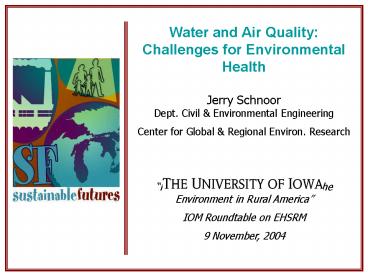Water and Air Quality: Challenges for Environmental Health - PowerPoint PPT Presentation
1 / 10
Title:
Water and Air Quality: Challenges for Environmental Health
Description:
So here's a quiz: What does this graph illustrate, 1866-2001? ... to be invested with a coating of nasty, slimy sediment from the unclean water. ... – PowerPoint PPT presentation
Number of Views:89
Avg rating:3.0/5.0
Title: Water and Air Quality: Challenges for Environmental Health
1
Water and Air Quality Challenges for
Environmental Health Jerry Schnoor Dept. Civil
Environmental Engineering Center for Global
Regional Environ. Research Rebuilding the
Unity of Health and the Environment in Rural
America IOM Roundtable on EHSRM 9 November, 2004
2
So heres a quiz What does this graph
illustrate, 1866-2001? A) Iowa income B) life
expectancy C) population of animals D)
fertilizer applications E) or corn yield?
3
E) Iowa Average Corn Yield, 1866-2001
4
The Good Old Days
- Right (top) Buck Creek Farm, Iowa, Washington
County, 1918 - Old settlers say the Iowa River used to be a
clear stream, except during high water, but now
it is always muddy or slimy, and stones or
boulders lying in the water that used to be clean
are now found to be invested with a coating of
nasty, slimy sediment from the unclean water. The
plowing and cultivation of the land causes more
loose soil and vegetable debris to be washed into
the River than could be washed in from the
prairie sod From History of Johnson County,
Iowa, 1836-1882, Iowa City, 1883. - Right (below) Iowa Geologists Picnic, 1911.
Photos courtesy of Calvin Photographic
Collection, Paleontology Repository, UI
Geosciences.
5
Upper Mississippi River Basin (UMRB) Runoff Costs
- Sediment clogs habitats threatening 1.2 B/yr
recreation and 6.6 B/yr tourism industries
impairing aquatic life - Nutrients drain to Gulf of Mexico causing Gulf
Hypoxia (31 from IA/IL) - Dredging costs more than 100 M/yr
- Levees and dikes may contribute to downstream
flooding at billions per yr
6
Iowas Water Resources (land of __ lakes)
7
Water Quality Trends Inland Waters
- Inland lakes and rivers generally improved during
the period 1970-1990 due to the 1972 Clean Water
Act. Point source discharges by industries and
municipalities were controlled, including Iowa. - But now, the largest remaining sources are
nonpoint including - Agricultural runoff
- Stormwater (urban)
- Septic tank discharges
- Atmospheric deposition
- Waste storage lagoons
8
Iowa Small Stream Assessment 1994-1998 Sediments
and nutrients are the main causes of the
impairments
Source Tom Wilton, Iowa Department of Natural
Resources
9
Iowa Water Quality
- Water quality in Iowa is not improving any
longer. It is difficult to discern all the
trends because monitoring is insufficient, but
the following seems to be true - Nitrate concentrations are getting worse in the
Racoon, Des Moines, and Iowa Rivers during the
past 40 years Nitrogen fertilizer applications
decreased in early 1990s, but are now at an
all-time high of more than 150 lbs/ac-yr - Increased conservation tillage in the State has
led to some improvement in TSS and tot P in
rivers Still, every lb of corn each yr results
in almost 2 lbs of sediment eroding from the
land! - Increased density and number of CAFOs has led to
local water quality problems and fish kills in
some counties - Excessive use of pesticides and fertilizers, even
the cities!
10
Nitrate concentrations in rivers and streams have
been increasing due to fertilizer use































